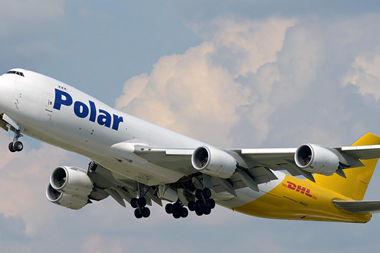Polar Air Cargo's efforts to dismiss a fraud lawsuit brought by freight forwarder Cargo On Demand (COD) have been successful.
The civil Racketeering Influenced and Corrupt Organizations Act (RICO) lawsuit was filed late last year in the Southern District of New York Court.
And in April, 10 individuals were charged with defrauding the airline. These individuals included four former Polar employees, plus six “vendor defendants".
The COD v Polar case focused on claims that the Atlas Air Worldwide/DHL Express subsidiary did not comply with the terms of a blockspace agreement, in which it agreed to provide COD with a specified amount of shipping cargo space for certain air routes.
COD said it was required to pay certain third-party consulting fees to companies with which certain members of Polar management were directly involved.
Additionally, Polar was also accused of undermining COD's relationship with its customers by reducing cargo space during peak season, wrongfully reporting payment defaults and blocking the forwarder from using its e-booking platform.
A case filing by the Southern District of New York Court on July 11 stated: "COD alleges that Polar defrauded it of at least $4m dollars by charging illicit fees, poaching COD’s customers, and abruptly terminating the parties’ contract."
However, according to the Court document, once Polar became aware the consulting fees were actually part of an "illicit" payment scheme involving individuals within the company, it terminated the agreement.
The Court document noted: "In the summer of 2021, however, Polar’s chief operating officer, Lars Winkelbauer, directed COD to stop paying the consulting fees. Shortly thereafter, Polar sent COD a sixty-day notice terminating the agreed-upon pricing for certain flights, ostensibly due to COVID-19. At the same time, Polar reassured COD that COD remained a valued partner."
Following this, on December 20 2021, Polar informed COD that it intended to terminate their relationship, effective December 31, 2021, said the document. Polar also terminated agreements with other freight forwarders.
According to the Court document, Polar cited the fact that Polar Management and the third-party consulting companies had been engaged in an illicit payment scheme as the reason for ending its agreement, but COD said that Polar continued doing business with COD after discovering the payment scheme and that Polar did not state the reason for terminating the business relationship.
The Court dismissed COD's RICO claim, and noted that "ordinary corporate fraud, conducted by or through employees or agents of a single corporation, cannot be dressed up as a
RICO claim".
The Court added that "even if COD did plausibly allege the existence of a RICO “enterprise,” its claims would fail for an alternative reason: a failure to plausibly allege a pattern of racketeering".
COD’s allegations of tax fraud were also rejected.
Furthermore, the Court said COD "is devoid of facts supporting an inference that Polar knew any transaction involving the consulting fees was designed to conceal the fees or avoid reporting requirements".
It added: "But even if the consulting fee payments did, in fact, lower Polar’s payroll tax liabilities, these allegations do not support an inference that Polar knew this was a purpose of the payments to the consulting companies.
"Absent plausible allegations of Polar’s knowledge, COD fails to allege that Polar engaged in money laundering."
The Court did note that allegations of wire fraud were COD's strongest claim, "if only because there is good reason to believe that members of Polar Management engaged in fraud and used wires in furtherance of the scheme", however it added "here too, it falls short as the Complaint fails to sufficiently allege a fraud scheme of which COD was a victim".
COD's allegations about the consulting fee payments, and an email regarding this "do not demonstrate that COD misunderstood the nature of the payments".
"In fact, if anything, the email suggests COD’s awareness of the illicit nature of the payments."
The Court summarised: "In short, COD provides no factual basis for its claim that it was misled or defrauded by Polar. Accordingly, it fails to establish wire fraud predicate acts as well.
In sum, COD fails to adequately plead that Polar committed any predicate acts, let alone a pattern of racketeering activity. Thus, its substantive RICO claim must be and is dismissed."
COD also failed to bring a RICO conspiracy claim against Polar, and was unable to prove evidence of Polar’s knowledge of, and agreement to participate in the scheme.
"The fact that Polar uncovered the scheme after the fact, however, does not support an inference of Polar’s knowledge of, let alone agreement with, the scheme at the time it was happening," said the Court document.
The Court stated that: "Polar’s motion to dismiss must be and is GRANTED."
The Court will grant COD "one final opportunity to amend" its complaint. COD is required to file any amended complaint within thirty days.
But the Court stressed that the "indictment raises the possibility that COD was complicit in, rather than a victim of, any fraud by executives at Polar".














